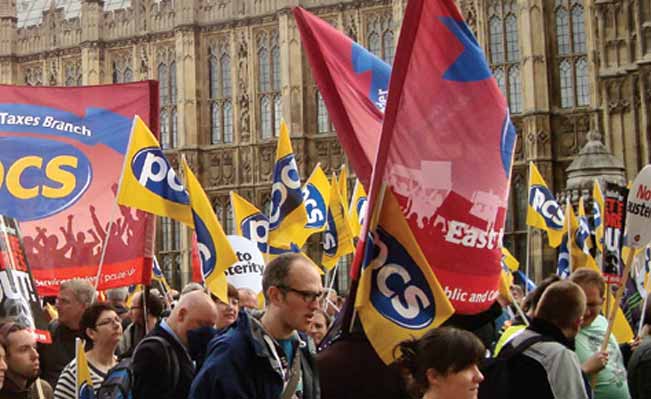 Trade unions march against cuts, October 2012. Photo: Juls Newton/Flicker
Trade unions march against cuts, October 2012. Photo: Juls Newton/Flicker
The Tories are planning the biggest assault on rights at work since the 1980s. Peter Stauber spoke to Richard Allday of Unite the Union’s National Executive Committee about the new legislation
When the Financial Times – not, as a rule, a staunch ally of the working class – accuses the Tory government of being eager to pick a fight with workers, the issue must be serious. It is. !e Trade Union Bill is the biggest attack on employees since the 1980s and aims to make it almost impossible for them to defend their rights.
The Bill proposes to raise the minimum turnout in strike ballots and gives employers the right to use agency workers as strike breakers. It would also limit their capacity to influence Labour Party policy: the Bill requires all unions to ask members if they want to pay the political levy every five years.
And once a union has jumped all the hurdles and organises industrial action, the government’s “modernisation” of picketing rules would place severe restrictions on striking workers. The Bill would impose heavy financial penalties if picket supervisors don’t wear official armbands, and requires unions to publish their plans related to picketing in advance. That would mean, for example, that they have to inform the authorities about how many people are going to be involved in the picket, whether they are going to use banners and loudspeakers, and whether they will be using Facebook or Twitter.
Industrial action
“What’s disgusting about this Bill is that it does nothing whatsoever to increase the participation of trade union members in deciding on industrial action,” says Richard Allday, who is a branch secretary in road haulage and a member of Unite’s National Executive Council. “Most people, including trade union members, would actually agree that you shouldn’t call people out on strike unless you have a majority. But this Bill is designed to reduce participation.”
If the government were serious about increasing the democratic mandate of strikes, says Allday, they could simply insist on secure workplace ballots, supervised by an outside body like the Electoral Reform Society. “But they’re not interested in increasing the democratic mandate. That’s why they are insisting that there have to be postal ballots, where the worker votes at home, separated from their workmates, as an individual instead of part of a collective.”
The purpose of the Bill is not to increase democracy, but to make strikes nearly unworkable. One of Trade unions march against cuts, October 2012 the most pernicious proposals in the Bill is the end of the ban on using agency workers as strike breakers. This could lead to major divisions, as Allday explains: “Agency workers are drawn disproportionately from migrant communities in this country – they usually get the rough end of the stick, so they’re also least likely to be in permanent jobs and most likely to be in precarious work and working for agencies.”
If they were used by an employer to undermine a strike, the effect on communities would be devastating. “One section of the community would be perceived as breaking the strike that is democratically supported by another section of the community. !is has the potential for real division.” All this comes at a time when strikes are at a low point anyway. Last year, less than 800,000 working days were lost due to industrial action. Even though this is more than the average for the 2000s, it is still pretty insignificant compared to the 1980s, when the figure was several million each year.
But then the experience of past industrial disputes is not really what this is about. Allday sees the Bill as a preparation for the cuts agenda that the government is embarking on – as a means to reduce resistance to the austerity agenda. It also attempts to shi” public sector jobs – which are generally well unionised – into the private sector.
“We have to hammer home to people that this is not an attack on trade unions per se, but on working people in general,” says Allday. “The Bill is going to affect anybody who wants to protest against the government’s cuts agenda.”
This article originally appeared in October’s free Counterfire paper. Contact us if you’d like copies to distribute.

